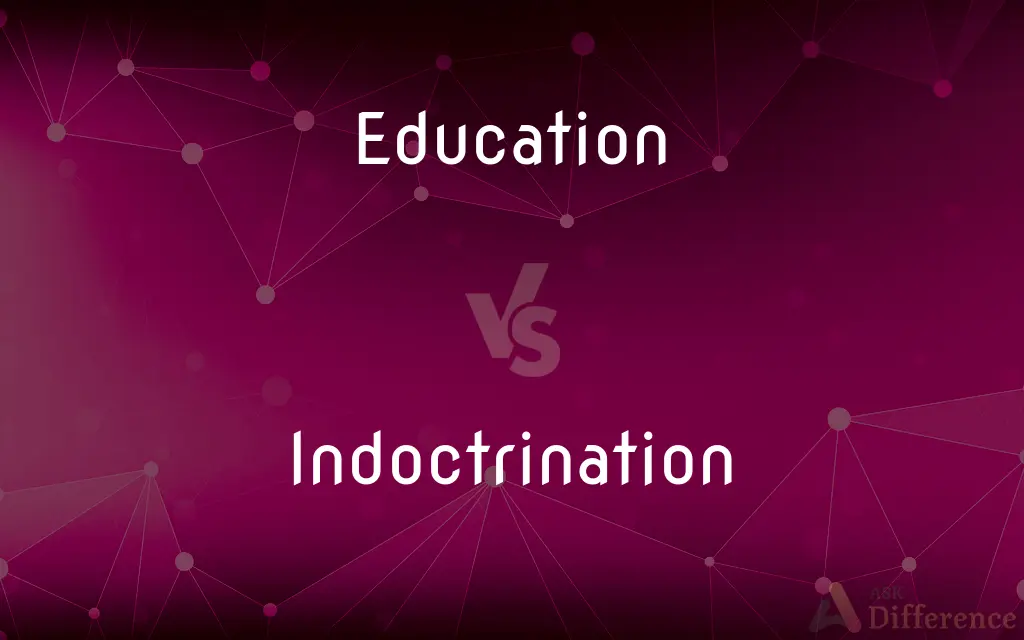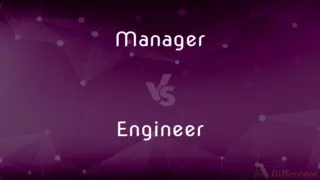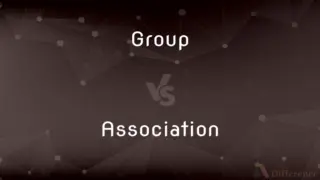Education vs. Indoctrination — What's the Difference?
By Fiza Rafique & Urooj Arif — Updated on April 17, 2024
Education fosters critical thinking and offers diverse perspectives, whereas indoctrination imposes specific beliefs, limiting critical evaluation.

Difference Between Education and Indoctrination
Table of Contents
ADVERTISEMENT
Key Differences
Education emphasizes the development of critical thinking skills and encourages students to explore various viewpoints. In contrast, indoctrination focuses on the unilateral transmission of specific doctrines or ideologies without encouraging scrutiny or debate.
Education aims to equip individuals with the tools to analyze and question information, fostering intellectual independence. On the other hand, indoctrination seeks to mold individuals’ thinking to a predetermined set of beliefs, often discouraging dissent.
Educational processes are generally inclusive of differing opinions and scientific methods, aiming to produce well-rounded individuals. Conversely, indoctrination often relies on repetitive and unquestioned learning methods that discourage the understanding of alternative perspectives.
In education, the role of the educator is to facilitate learning, presenting information impartially and supporting the learner’s personal growth. Whereas in indoctrination, the educator often acts as an authority figure who delivers content that must be accepted without critical challenge.
Education is recognized for its ability to adapt and evolve with new discoveries and societal changes. In contrast, indoctrination typically maintains a static set of beliefs that resist change and often conflict with emerging evidence or new viewpoints.
ADVERTISEMENT
Comparison Chart
Purpose
To promote critical thinking and knowledge.
To instill specific beliefs or ideologies.
Method
Interactive and questioning.
Authoritative and often repetitive.
Content
Broad and inclusive of diverse views.
Narrow and focused on particular doctrines.
Role of Educator
Facilitator and guide.
Authority and transmitter of fixed beliefs.
Adaptability
Evolves with new information and societal changes.
Generally rigid and unchanging.
Compare with Definitions
Education
A process of facilitating learning, or the acquisition of knowledge, skills, values, and habits.
Education systems worldwide vary but typically involve structured schooling.
Indoctrination
Often involves methods that discourage questioning and criticism.
Indoctrination can occur through propaganda.
Education
Education encourages questioning and exploration of different subjects.
Education through science promotes experimentation and hypothesis testing.
Indoctrination
Aimed at maintaining control over beliefs and behaviors.
Religious indoctrination can start from a very young age.
Education
An enlightening experience that broadens perspectives.
Travel is often considered an important part of education.
Indoctrination
The process of teaching a person or group to accept a set of beliefs uncritically.
Indoctrination is common in totalitarian regimes.
Education
Aimed at personal and social development.
Education reforms focus on preparing students for global citizenship.
Indoctrination
Seeks to instill loyalty and conformity.
Political indoctrination is often a goal in state-controlled media.
Education
A lifelong process that extends beyond formal schooling.
Continuing education is key to career advancement.
Indoctrination
Typically one-sided and not open to alternative views.
Indoctrination avoids the discussion of conflicting evidence.
Education
Education is the process of facilitating learning, or the acquisition of knowledge, skills, values, morals, beliefs, and habits. Educational methods include teaching, training, storytelling, discussion and directed research.
Indoctrination
Indoctrination is the process of inculcating a person with ideas, attitudes, cognitive strategies or professional methodologies (see doctrine).Humans are a social animal species inescapably shaped by cultural context, and thus some degree of indoctrination is implicit in the parent–child relationship, and has an essential function in forming stable communities of shared values. The precise boundary between education and indoctrination often lies in the eye of the beholder.
Education
The act or process of educating or being educated.
Indoctrination
To instruct in a body of doctrine or principles.
Education
The knowledge or skill obtained or developed by a learning process.
Indoctrination
To imbue with a partisan or ideological point of view
Children who had been indoctrinated against their parents' values.
Education
A program of instruction of a specified kind or level
Driver education.
A college education.
Indoctrination
The act of indoctrinating, or the condition of being indoctrinated
Education
The field of study that is concerned with the pedagogy of teaching and learning.
Indoctrination
Instruction in the rudiments and principles of any science or belief system; information.
Education
An instructive or enlightening experience
Her work in an animal shelter was a real education.
Indoctrination
The act of indoctrinating, or the condition of being indoctrinated; instruction in the rudiments and principles of any science or system of belief; information.
Education
(uncountable) The process of imparting knowledge, skill and judgment.
Good education is essential for a well-run society.
Indoctrination
Teaching someone to accept doctrines uncritically
Education
(countable) Facts, skills and ideas that have been learned, especially through formal instruction.
He has had a classical education.
The educations our children receive depend on their economic status.
Education
The act or process of educating; the result of educating, as determined by the knowledge skill, or discipline of character, acquired; also, the act or process of training by a prescribed or customary course of study or discipline; as, an education for the bar or the pulpit; he has finished his education.
To prepare us for complete living is the function which education has to discharge.
Education
The activities of educating or instructing or teaching; activities that impart knowledge or skill;
He received no formal education
Our instruction was carefully programmed
Good teaching is seldom rewarded
Education
Knowledge acquired by learning and instruction;
It was clear that he had a very broad education
Education
The gradual process of acquiring knowledge;
Education is a preparation for life
A girl's education was less important than a boy's
Education
The profession of teaching (especially at a school or college or university)
Education
The result of good upbringing (especially knowledge of correct social behavior);
A woman of breeding and refinement
Education
The United States federal department that administers all federal programs dealing with education (including federal aid to educational institutions and students); created 1979
Common Curiosities
What is the main goal of education?
To develop a person’s intellectual and emotional capabilities.
How does indoctrination differ from education in terms of content delivery?
Indoctrination delivers content in a dogmatic and often repetitive manner, while education encourages interactive and critical engagement.
How does one identify if a system is educational or indoctrinatory?
A system that encourages open discussion and critical thinking is educational; one that suppresses dissent and promotes a single viewpoint is indoctrinatory.
What techniques are commonly used in indoctrination?
Techniques include repetitive messaging, emotional appeals, censorship of dissenting views, and the authoritative delivery of content.
Can indoctrination have long-term effects on individuals?
Yes, indoctrination can deeply influence an individual's beliefs and behaviors, potentially affecting their worldview and interactions throughout life.
Can indoctrination ever be part of an educational curriculum?
Yes, elements of indoctrination can be embedded within an educational curriculum, often in the guise of promoting specific ideological viewpoints.
How can parents distinguish between education and indoctrination in schools?
Parents can look for signs of critical engagement and openness to diverse perspectives in the school's curriculum and teaching methods.
Is indoctrination always negative?
While often viewed negatively, some argue that some forms of indoctrination, such as instilling values of kindness and justice, can be beneficial.
How can teachers avoid indoctrination in the classroom?
Teachers can avoid indoctrination by presenting multiple viewpoints, encouraging open discussion, and fostering critical thinking skills in students.
What is the impact of technology on education and indoctrination?
Technology in education can enhance learning and access to diverse viewpoints, whereas in indoctrination, it can be used to spread biased information widely and quickly.
What are the key characteristics of a good educational system?
A good educational system promotes inclusivity, adaptability, critical thinking, and prepares students for effective participation in society.
Is indoctrination more prevalent in certain types of educational institutions?
Yes, indoctrination is more likely in institutions where there is strong ideological control or where there is limited freedom of expression.
How do democratic societies ensure their educational systems are free from indoctrination?
Democratic societies typically promote educational standards that ensure transparency, accountability, and the inclusion of multiple perspectives in the curriculum.
Are there any positive aspects of indoctrination?
Some argue that certain forms of indoctrination, like reinforcing societal norms such as respect and responsibility, can have positive effects.
What role does critical thinking play in education?
Critical thinking is central to education, as it enables individuals to analyze information, make reasoned judgments, and solve problems effectively.
Share Your Discovery

Previous Comparison
Manager vs. Engineer
Next Comparison
Group vs. AssociationAuthor Spotlight
Written by
Fiza RafiqueFiza Rafique is a skilled content writer at AskDifference.com, where she meticulously refines and enhances written pieces. Drawing from her vast editorial expertise, Fiza ensures clarity, accuracy, and precision in every article. Passionate about language, she continually seeks to elevate the quality of content for readers worldwide.
Co-written by
Urooj ArifUrooj is a skilled content writer at Ask Difference, known for her exceptional ability to simplify complex topics into engaging and informative content. With a passion for research and a flair for clear, concise writing, she consistently delivers articles that resonate with our diverse audience.















































